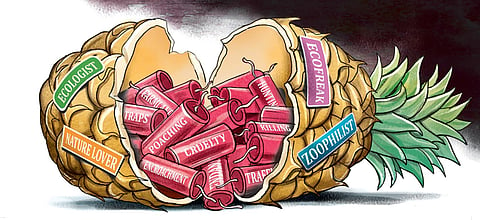

The horrendous killing of a 15-year-old pregnant elephant in the Mannarkkad forest division of Kerala has attracted the attention of the national and international press. More than anything, it was the brutal manner of the death—the elephant died of wounds it suffered while chewing a pineapple stuffed with explosives—that drew worldwide condemnation. This single act of mindless cruelty has inflicted a body blow to Kerala’s carefully crafted image of a literate, progressive and tolerant state.
A region that attracted positive reports for its efforts in containing Covid-19 very recently is now being looked on, in many quarters, as the home of boorish vandals. While what happened to the elephant can be cast aside as a single standalone incident, does it also not reveal some deep fault lines in our psyche?
While forest-dwelling animals are mostly invisible to the common man, we are indeed witness to extreme cruelty that we exhibit towards other living beings in our midst.
Meat is a predominant item in the daily diet of many people. And being a matter of personal choice, none can quarrel with meat eaters on this score. But the manner in which we transport, maintain and slaughter animals would be revolting to any observer. Every day we see animals, mostly cows and buffaloes, transported in constricted carriers with no food or water. While some local bodies do have abattoirs, most animals are slaughtered in abandoned grounds or sheds.
We know that in most civilised societies, animals are killed painlessly and instantly using guns that stun the animal first. But we take recourse to brutal methods. Not infrequently we read reports of panicked animals with their necks partly cut running on public roads until cheering crowds chase them down and bring them back to complete the deed. Carcasses are transferred in three-wheelers spewing gore on the roads and on reaching the shops, they are hung out for display. Anyone who passes by, including little children on their way to school, are witness to this macabre display of flesh and dripping blood.
It is an admitted fact that captive elephants are often victims of extreme cruelty and in the inevitable conflict arising out of this, several elephants, mahouts as well as members of the public have lost their lives. In this context, an effort made by the state government and the unsatisfactory end it met with is relevant. During 2001-03, when this author was working as Secretary of the Forests and Wildlife Department, Kerala, a unique law was framed, aimed at the protection and maintenance of captive elephants. Issued with the assent of the legislature, it spelt out clear and inviolable conditions that every elephant keeper was required by law to follow. Strict penalties, including jail term, were prescribed for violators. It was hailed as a pioneering step nationally. Yet, the implementation suffered due to opposition from various lobbies and finally the government itself chose to bury it in 2012, when the associated penal provisions were withdrawn.
Getting back to the unfortunate elephant that was tortured to death, we should not lose sight of the circumstances that led her to be administered the spiked pineapple. A former central minister, an avowed animal lover, very nearly diverted the issue by alleging that the dastardly act was done in Malappuram district and not in Palakkad, where the animal met its end. She is a respected animal rights activist but her comments were inappropriate and intemperate. It is not that the Palakkad offender, if guilty, is any less of an offender of the Wildlife Act than his Malappuram cousin! Sadly, the controversy over the minister’s remarks did cause the focus to shift, with Kerala-based news channels holding long debates between detractors and defenders of Malappuram. So great is Kerala’s obsession with politics over all else.
Like everything else in Kerala, this event has also seen another story emerging. Due to incessant animal attacks on their crops and livelihood, and apathy of the forest department, the farmers in areas abutting the forests are forced to resort to illegal means. This is a tale by itself. Over the years, settlers have been claiming lands that had once been thick forests. Encouraged by their example, more and more encroachment is taking place and the changing governments have been working overtime to regularise these encroachments. The Gadgil and the much-watered-down Kasturirangan reports were met with protests and rioting. Predictably, the first victims of arson are government offices where old documents are kept. When the heavens opened up during the monsoon months in 2018 and 2019, there was a brief period of introspection. Then all was business as usual.
Amidst this pandemonium, where are animals supposed to go and subsist? As for elephants, those who know of their behaviour tell us that they traverse the same path that they have been using for centuries. Any crop that springs up in this ‘elephant corridor’ is fair game for these beasts. Also included are pineapples with crackers stuck inside. It is up to us to reform and realise that we too are only a link in the chain of nature.
E K Bharat Bhushan
Former Chief Secretary to Government of Kerala
(bbhushan55@gmail.com)